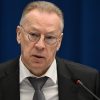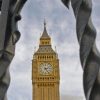
Meghan Markle has described the experience of miscarriage as “an almost unbearable grief experienced by many but talked about by few”.
Credit: AP Photo/Kirsty Wigglesworth
The Duchess of Sussex has written a deeply personal account of suffering a miscarriage.
In an opinion piece titled The Losses We Share for the New York Times, the Duchess, 39, revealed that she had lost her unborn, second child in July.
She described the experience as “an almost unbearable grief experienced by many but talked about by few”.
She noted that despite the “staggering commonality of this pain”, the subject remains taboo, “riddled with (unwarranted) shame, and perpetuating a cycle of solitary mourning.”
And she suggested that she decided to speak out in order to encourage others to do the same, to encourage others to listen and in doing so, lighten the load for others who are grieving.
The Duchess is described in her byline as "a mother, feminist and advocate," indicating how she defines her new role away from the Royal Family.
‘I knew, as I clutched my firstborn, that I was losing my second’
In the 1,075-word opinion piece, the Duchess revealed that she had begun the day like any other, before suffering a sharp stomach pain and realising instantly that she was losing her baby.
She wrote: “It was a July morning that began as ordinarily as any other day: Make breakfast. Feed the dogs. Take vitamins. Find that missing sock.
“Pick up the rogue crayon that rolled under the table. Throw my hair in a ponytail before getting my son from his crib.

The Duchess said she 'dropped to the floor with (Archie) in my arms'
Credit: Dominic Lipinski/PA Wire
“After changing his diaper, I felt a sharp cramp. I dropped to the floor with him in my arms, humming a lullaby to keep us both calm, the cheerful tune a stark contrast to my sense that something was not right.
“I knew, as I clutched my firstborn child, that I was losing my second.”
The Duchess was taken to hospital, where she and the Duke of Sussex clung to each other, overwhelmed by grief.
“I felt the clamminess of his palm and kissed his knuckles, wet from both our tears,” she wrote.
“Staring at the cold white walls, my eyes glazed over. I tried to imagine how we’d heal.”
‘Are you ok?’
The Duchess said that in the moment, she recalled the moment last September when the couple were finishing a long tour in South Africa and she was exhausted, breastfeeding their baby son Archie and “trying to keep a brave face in the very public eye” when ITV journalist Tom Brady asked her if she was OK.
“I answered him honestly, not knowing that what I said would resonate with so many — new moms and older ones, and anyone who had, in their own way, been silently suffering,” she said.
"Not many people have asked if I’m ok … it’s a very real thing to be going through behind the scenes."
Meghan reveals to ITV's @tombradby the intense media spotlight has left her struggling to cope while becoming a mum #HarryAndMeghan https://t.co/Uy21iE6ozJ pic.twitter.com/kZqhZV66OL
— ITV News (@itvnews) October 18, 2019
“My off-the-cuff reply seemed to give people permission to speak their truth. But it wasn’t responding honestly that helped me most, it was the question itself.
“Thank you for asking,” I said. “Not many people have asked if I’m OK.”
“Sitting in a hospital bed, watching my husband’s heart break as he tried to hold the shattered pieces of mine, I realised that the only way to begin to heal is to first ask, ‘Are you OK?’
“Are we? This year has brought so many of us to our breaking points. Loss and pain have plagued every one of us in 2020, in moments both fraught and debilitating.”

The Duchess said she recalled the moment last September when the couple were finishing a long tour in South Africa and she was exhausted, breastfeeding their baby son Archie and “trying to keep a brave face in the very public eye” when ITV journalist Tom Brady asked her if she was OK.
Credit: REUTERS/Toby Melville
Pandemic has left us feeling ‘more alone than ever’
The Duchess went on to describe how a woman lost her mother to coronavirus, how another man woke up feeling slightly ill and within weeks, he too had died.
She referenced Breonna Taylor, the 26-year-old African-American who was fatally shot by white police officers and George Floyd, also killed by a police officer in the US.
“Peaceful protests become violent. Health rapidly shifts to sickness. In places where there was once community, there is now division,” she wrote.
“On top of all of this, it seems we no longer agree on what is true. We aren’t just fighting over our opinions of facts; we are polarized over whether the fact is, in fact, a fact. We are at odds over whether science is real.
“We are at odds over whether an election has been won or lost. We are at odds over the value of compromise.”
“That polarisation, coupled with the social isolation required to fight this pandemic, has left us feeling more alone than ever.”

A protester shouts "Black Lives Matter" during a rain storm in front of Lafayette Park next to the White House, Washington, DC on June 5, 2020
Credit: ROBERTO SCHMIDT/AFP
Miscarriage means carrying ‘almost unbearable grief’
The Duchess described a moment when she was in her late teens and saw a woman on the phone in floods of tears on a pavement in New York.
She asked her taxi driver to stop but he told her: “Don’t worry, somebody on that corner will ask her if she’s OK.”
“Now, all these years later, in isolation and lockdown, grieving the loss of a child, the loss of my country’s shared belief in what’s true, I think of that woman in New York. What if no one stopped? What if no one saw her suffering? What if no one helped?”
She said she wished she could go back to that moment and stop to speak to the woman.
“Losing a child means carrying an almost unbearable grief, experienced by many but talked about by few,” she said.
“In the pain of our loss, my husband and I discovered that in a room of 100 women, 10 to 20 of them will have suffered from miscarriage. Yet despite the staggering commonality of this pain, the conversation remains taboo, riddled with (unwarranted) shame, and perpetuating a cycle of solitary mourning.
“Some have bravely shared their stories; they have opened the door, knowing that when one person speaks truth, it gives license for all of us to do the same.
“We have learned that when people ask how any of us are doing, and when they really listen to the answer, with an open heart and mind, the load of grief often becomes lighter — for all of us. In being invited to share our pain, together we take the first steps toward healing.”
The ‘new normal’
The Duchess went on to urge people, as Thanksgiving approaches, to commit to asking others if they are OK.
She ended on a positive note, suggesting that, four months after the devastating experience of miscarriage, both she and the Duke are coming to terms with their loss.
“We are adjusting to a new normal where faces are concealed by masks, but it’s forcing us to look into one another’s eyes — sometimes filled with warmth, other times with tears,” she wrote.
“For the first time, in a long time, as human beings, we are really seeing one another.
“Are we OK?
“We will be.”























































Свежие комментарии